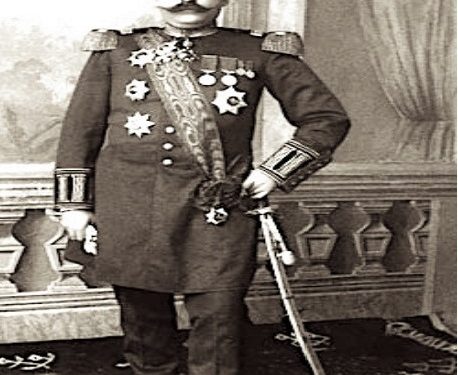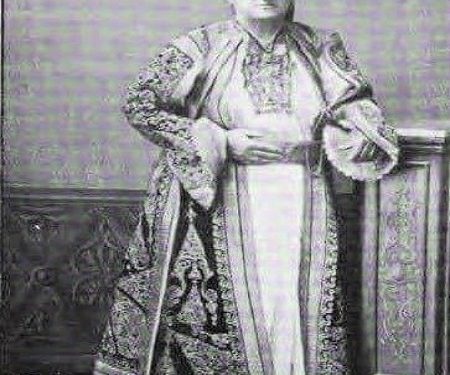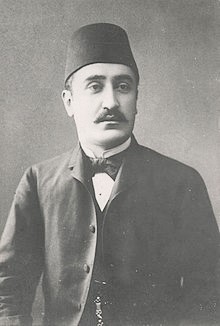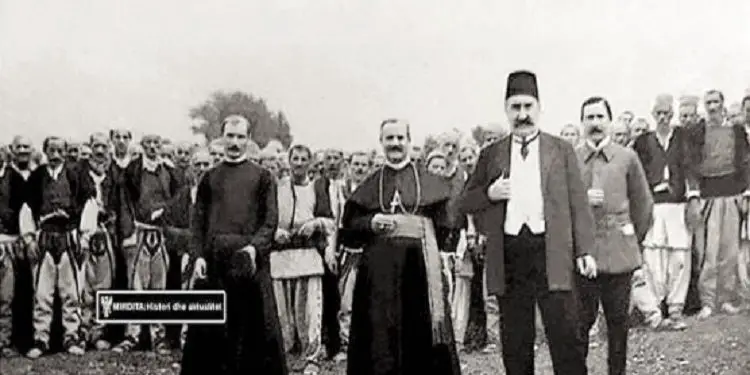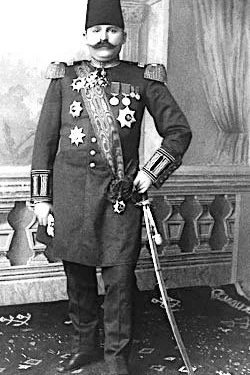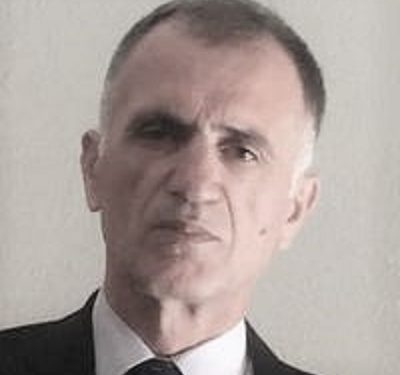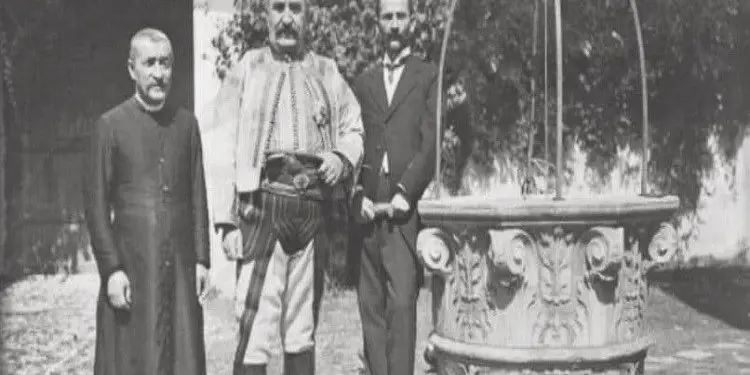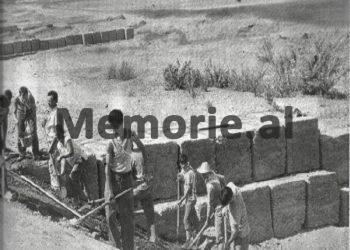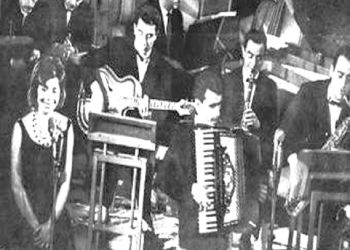By Dr. Nikol Loka
The twelfth part
“PRENGA BIBE DODA, THE SHADOWS OF A CITIZENSHIP”
Memorie.al / The newest book “Prengë Bibë Doda, a phenomenon in Albanian political life”, by researcher Nikollë Loka, not only expands the scope of historical studies on Mirdita, the Door of Gjonmarkaj and the figure of the Mirdita Prince, Prengë Bibë Doda, but it is also a contribution to national historiography. The very rich archival material, the literature used or consulted, oral traditions, etc., make this book a real study treasure, giving the science of history a scientific monograph that enriches our knowledge of Mirdita, its captains, tradition, history etc. To study such an important and complex figure, as the figure of Prengë Biba Doda, is a high scientific responsibility that not everyone undertakes. Nikollë Loka, has done a great job of research and treatment by the professional researcher, giving us the portrait of the Prince and the general Mirditor, with the true contours. Dr. Loka has adhered to the end of the space and time, in which the multidimensional events and their protagonists have developed.
THE MONOGRAPH “ABOUT BIBË DODA, A PHENOMENON IN ALBANIAN POLITICAL LIFE”, A VALUABLE SCIENTIFIC STUDY THAT ENRICHS THE FUND OF OUR HISTORICAL STUDIES
(By Mr. Sc. Murat Ajvazi, March 2017, Switzerland)
Continues from last issue
Prengë Bibi Doda’s first mission
The arrival of Prengë Biba Doda was preceded by the intense movement of the leaders of Mirdita, who repeated their demands to the authorities. In communication with the Ottoman officials, they gave arguments why Muslim kaymekams should not be appointed in Mirdita. According to the leaders, “the appointed kajmekams did not have the proper skills or the knowledge of customs and laws, causing the affairs of the people to be confused. We demand the return of the son of Biba Dodë Pasha, who, with the kindness of the Sultan, grew up in Istanbul and was educated in government schools. We all desire him and are happy to have him among us, since he knows our affairs and would enjoy proper authority.” (223)
Then, on April 5, 1876, the leaders of Mirdita met with Valiu Hamdi Pasha and asked for the return of Biba Doda’s son and his appointment as head of Mirdita. (224)
But the High Gate was not ready to fully accept the request of the midday chiefs. There is talk of replacing Hajdar aga, the pseudo kajmekam of Mirdita, with Captain Gjon Doda, who would administer the country, according to other customs. (225)
Thus, the function of the head of the province was judged to be taken by one of the Kapidans at first, and in a later period, he could be easily replaced by a Muslim kaymekam, while the natural head of the Mirditas could work anywhere, except for the province of Brightening.
Seeing that this maneuver of the Turkish authorities did not hold water and Gjon Doda would not be accepted to exercise his official function, Valiu Hamdi Pasha changed his mind and appointed Reshit Beu, from the Muslim parish of Shkodra, in his place. (226)
Betrothed to Biba Doda, he came to his hometown at a young age and from the beginning, he was faced with the difficult task of leading Mirdita, then on the verge of an uprising. The 18-year-old boy did not know the leaders and the people, so he had to rely on Abbot Doçi, who guided him towards an independent policy, from the Porta. Likewise, his mother, Margjela, had power in his decisions.
In the first days of December, before the assembly of Shënpal, Prend Doçi is sent to Cetina for talks. For this purpose, he is accredited with a cover letter from Prengë Bib Doda, to Prince Nikola, in which, among other things, it is written: “Prengë Bibë Doda, to Prince Nikola, Oroshi, on December 5, 1876, I thank you, Your Majesty, for the special care and protection of my cousin, Kola. Don Primo Doçi, I will convey to you my feelings of respect, as well as from Captain Kola. Live full, for the respect of Your Majesty, in which Don Primo Doçi, will find all the high qualities even to the greatest extent, will prove (if possible), the bond and brotherhood of our two peoples… “. (227)
The fact is that, Dom Prend Doçi, brought not only a bond treaty, but what is important, also money. Before the Mirditas, it was a defined political program to implement autonomy, as it had been in the time of Biba Doda.
With this request, Prenga reminded the authorities of their commitment and, in compliance with it, Mirdita would mobilize on the side of the Turks, in a future Turkish-Montenegro war. In practice, things went differently. The Turkish authorities in Shkodër did not let the young prince go to Mirdita, and instead of allowing him to go to Orosh, they sent him to Podgorica, to the headquarters of the forces operating against Montenegro. (228)
This attitude of Istanbul made the new Captain connect with those states that supported the autonomy of Mirdita. The French Consul in Shkodër warns of the exploitation of the discontent of the Mirditas by interested foreign powers:
“Opposition to return the young Prengë Bibë Doda to the homeland and appoint him Kajmekam means making the Mirditas ready, at a certain moment, for Austria”. (229)
With the issue of Mirdita, Austria-Hungary was also engaged, which had acquired the right of cult protectorate over the Catholics. (230)
But Austria-Hungary, for its interests, would also talk with the Ottoman Empire, (231) which means that; Vienna demanded the peaceful settlement of disputes and respect for the autonomy of the Province. Austria-Hungary was to create and maintain a balance in the Balkan region, between the peoples who lived there and a balance of the influence of the Great European Powers. The number of new states, and their territories, would also depend on the compromises made by the European states that had interests in the Balkans. (232)
Speaking about the Albanian issue, Haymerle emphasized that the “legitimate” expansion of Albania does not represent a direct danger for Austria-Hungary. Therefore, emphasized the Baron; “there were all the reasons that supported the Albanians”. But he opposed the discussion of the deputy Dr. Plenary, when he used the expression; “Albanian nation”. (233)
Meanwhile, Italy was also interested in the move to Mirdita. There, in September 1876, a committee of arborists was created to help the uprising. But because of the intentions of the Italian government towards Albania, the help of this committee was very little!
The idea of the “Principate” was also supported by Prince Nicholas of Montenegro, who wanted to use this movement for his own interests. In that situation, Prengë Bibë Doda, thought that the time had come to move from the demand for preserving traditional autonomy to a more advanced demand: the creation of the Principality of Mirdita, which would be autonomous and under the sovereignty of that state that would help bring it to life. It was thought that around this project, other highlands, neighboring Mirdita, would be united. A diplomat of the time emphasized that all the surrounding highlanders “regulate their positions according to Mirdita…! The Ottoman army will have to do with a confederation, the node of which is Mirdita…! This is a fact whose interests are important”. (234)
Anticipating the High Gate’s attitude towards Mirdita’s autonomy, Prenga had thought of new alliances. He had introduced the project of the “Principate of Mirdita” to the ambassadors of the Great Powers in Istanbul. The attitude of foreign diplomats had been different depending on the interests of each state. The Ambassador of France had advised the young Prince to wait for developments and then decide, taking into account the interests of the population, while the Ambassador of Austria had opposed any attempt to cause riots and emphasized: “This country, the status quo suits him”.
Vienna was worried about increasing Slavic penetration in this part of the Balkans. Regarding the positions of Vienna, Prengë Bibë Doda, emphasizes that; “because of special interests, this power is trying to make me its own, promising me other aids and advantages, in order to remain as in the past, under the complete dependence of the Porte. Although she promises me support, she pursues the goal she is interested in”. Pursuant to this policy, behind which special interests were hidden, on November 2, 1876, the Austro-Hungarian Government officially sent Prengë Biba Doda its opinion, that; “to maintain autonomy, both towards Porta and towards Montenegro”. The Russian government, for its part, wanted to use the movement of Mirdita, in the function of the war in Montenegro, making it a condition for Prenga to establish a military alliance with Cetina and attack the Ottoman army from behind, as soon as Montenegro, to enter the war. The same position was taken by the Russian Consul in Shkodër, who tries to keep the Mirditas in a semi-rebellious state, in order to use them behind the back of the Turkish army, in the event of a war against the Montenegrins.
On the other hand, the tsarist diplomats and Serbian emissaries, in November 1876, created the impression, as everywhere in Albania, that; “Russia could not accept the created situation and that soon; would enter the war. They tried to convince Prenga Biba Doda; to start the uprising, because according to them; “Mirdita would never find a more suitable moment, to gain its autonomy, than now that the Ottoman armies were decreasing in Albania, to concentrate on the Russian border”.
But Captain Mirditor gave the tsarist diplomats to understand that he would move only when the cannons began to roar on the Danube, that is, when Russia really declared war on the Ottoman Empire. (235)
Meanwhile, a group of intellectuals from Shkodra who followed the situation closely, through Lorenc Gurakuqi, the personal secretary of Prengë Bibë Doda, tried to put this uprising in the service of the Albanian National Movement.
Shkodra intellectuals encouraged Prenga to draw up a plan for the creation of a principality of Upper Albania, centered on Mirdita, and to seek the support of European powers. (236)
It was the same project that had been asked of his father. The creation of such a principality in Northern Albania, in the situation created by the Balkan crisis, was of great importance, for the protection of national rights, both against the Ottoman Empire, already in ruins, and against the Great Powers and dynasties. Balkans, who were supported by them.
The International Conference of Great Powers, which met in Istanbul on December 24, 1876, to settle the issues that had arisen from the Serbo-Montenegro war against Turkey, showed that Russia had no friendly attitude towards the Mirditas. St. Petersburg, submitted the request, for; the “reforms” that the Ottoman Empire had to make in the insurgent territories, without being interested at all, in the problem of Mirdita. Under Russian pressure, on the same day, the Porta, supported by England, announced the Constitution, and declared that in its framework, all the problems that concerned the nationalities of the Empire would be solved; therefore it considered the international conference unnecessary. With the cancellation of the conference, many thought that after this Istanbul game, Russia would declare war on Turkey. One of them was Prengë Bibi Doda.
On this occasion, he began preparations for an uprising. Unfortunately, international events took place differently than Prenga had expected and predicted. At the insistence of the Great Powers, the Conference held its proceedings, not in Istanbul, but in London. Russia did not enter the war, and even declared that it would participate in the proceedings of the conference, despite the fact that it began preparations, to win with its own weapons, what it had not achieved with the help of its weak allies. The demagogic intentions of Russia, towards Kapidani mirditas, were also seen during the proceedings of the London International Conference. Here, Russia insisted on the autonomy of Bosnia, Herzegovina, Bulgaria and Eastern Rumelia, while the problem of the “Autonomous Principality of Mirdita” was not even discussed.
Furthermore, at the end of the Conference, in March 1877, peace was concluded between Turkey and Serbia. Montenegro did not want to sign it, but was forced to accept the extension of the truce, until April 12, 1877. Thus, Mirdita was abandoned by Russia, Serbia and Montenegro and remained alone in front of the High Gate. The Turkish Government decided to use this circumstance to liquidate the new resistance of the Mirditas and their ancient poisons. The instigator of this energetic action was the strict general, Dervish Pasha, whose full name was Ibrahim Dervish Pasha, commander of the armed forces of the Shkodra Province, who had shown himself as a sworn enemy of the Albanians.
In the face of popular desire for war
It cannot be said with certainty that Kapidan Prenga chose war as the best means to realize his political goals. He was attentive to the advice of the consuls of the Great Powers and, at their behest, tried to restrain his forces from warlike action.
In the conditions when it seemed that Russia and Montenegro would enter the war, the Mirditas, can’t wait to start the uprising. In these conditions, Prengë Bibë Doda, went to Mirdita and gave impetus to the uprising movement. Wanting to take advantage of the situation, Prenga entered into relations with Serbian and Montenegrin governments. (237)
In these circumstances, on December 27, 1876 in Shpal, an assembly was held with representatives of the Bajraks of Mirdita, Puka and Gjakova Highlands. There it was decided: “To start the uprising in all of Mirdita; to extend it to all the northern provinces of Albania; not to accept any kind of compromise with the Turks; not to allow the establishment of the Turkish kaymekam in Mirdita and to send a delegation to Montenegro to look for new type weapons and ammunition”. After the assembly, its participants dispersed to the provinces, to organize assemblies and raise their populations to war. The representatives of this Assembly were also distributed in Malësi i Madhe, Shale, Shosh and Shkrel. Prengë Biba Doda’s intention was that the Mirdita uprising, if it started, would not be isolated, both on the internal and international level.
He sought to provide moral and material support and saw Mirdita as the center of a general uprising, which would also include other parts of Albania, if the situation was favorable for such a thing. The captain was aware that the decision to revolt would not be well received in all the diplomatic circles in Shkodër, so he made an effort to justify this decision of the leaders, as can be seen from the letter he sent to the Austrian consul on February 2, 1877: “It seems unbelievable, but it is true that the Turks have drawn up a plan for the general massacre of Albanians. I am obliged to openly announce …that; this people; has prepared and determined to stand bravely; to ensure self-defense in the country…! The horrors in Bulgaria have now been prepared for the population here.” (238)
While in the letter that Kolona wrote to Çekaldi, the Consul of France in Shkodër, it seems that he takes into account the suggestions that the French diplomat had given him, in order not to provoke Porta. “Following in every circumstance, the way of thoughts and convictions of the people of Mirdita … I am closely connected to the policy of uniting in a single regime, of all the inhabitants … to stand against the government, so that it does not have the opportunity, to destroy the peaceful work started by me, according to the will of the people”. (239)
So, it seems that the war was not instigated by Prenga and the situation on the ground was developing in a way that he could not control. But time proved that the conditions for that uprising were not ripe. The internal factors were still divided and the other highlands left Mirdita alone in front of the Turks. Montenegro, on the other hand, did not show that it was a reliable partner of the Mirditas, but was interested in the Mirditas losing the war, so that it would then be easier in front of the Catholic populations of the Highlands. Memorie.al
The next issue follows
- Ligor Mile, The Albanian League of Prizren in French Documents, vol. I-II, Tirana: 1978-1979
- Duke Dekaz, Minister of Foreign Affairs of France-Kolona Çekald, Consul of France in Shkodër, Versailles, April 5, 1876, see, Albania in the years of the Albanian League of Prizren, volume I
- Duke Dekaz, Minister of Foreign Affairs of France-Kolona Çekald, Consul of France in Shkodër, Versailles, April 5, 1876, see, Albania in the years of the Albanian League of Prizren, volume I
- Kolona Çekald, Consul of France in Shkodër-Dukës Dekaz, Minister of Foreign Affairs in Paris, letter No. 101, Shkodër April 13, 1876, Albania in the years of the Albanian League of Prizren, volume I.
- Jashar Rexhepagiq, Selected and contemporary pedagogical topics, Publishing House “Libri Schkollor”, Prishtina, 2002, Academy of Sciences and Arts of Kosovo, Special Publications, XXXIX, Book 11, p.490-491
- “Glas Cernogorca” newspaper, August 30, 1876, see Luigj Mratini, Princi pa forn i Mirdita,…, p.26
- Report of Fournie, Ambassador of France in Istanbul sent to the Minister of Foreign Affairs of France Frejsines, Istanbul February 14, 1880, Albania in the years of the Albanian League of Prizren, volume I
- Ambassador in Vienna Nigra, Minister of Foreign Affairs Brin, doc. 67 Vienna. August 3, 1892 Reservatio 1743/674. I Documenti Diplomatici Italiani, Seconda Serie: 1870-1896, Volume XXV, (15 MAGGIO 1892- 14 dicembre 1893), Ministero Degli Afari Esteri, Commissione per la Publicazione Dei Documenti Diplomatici, Instituto Poligraco e zecca Dello Stato, Liberia Dello Stato , Rome MCMXCVIII p. 52.
- Balkan Situation, Source: The American Journal of International Law, Vol. 3, No. 2 (Apr., 1909), pp. 448-451 (URL: http://www.jstor.org/stable/2186137).
- Daut Daut. The Albanian issue in British diplomacy 1877-1880, Logos 2012, p. 163,164.
- Daut Daut. The Albanian issue in British diplomacy…, p. 164
- Column Çekald, Consul of France in Shkodër-Dukës Dekaz, Minister of Foreign Affairs in Paris, letter No. 101, Shkodër April 13, 1876, Albania in the years of the Albanian League of Prizren, volume I
- Jasterbov, Russian diplomatic documents, No. 31, Shkodër, December 1876
- Aleks Buda, etc., History of the Albanian People, Volume II, National Renaissance, 1930s-1912, Academy of Sciences of Albania, “Toena” publications, Tirana 2002, p.136
- Aleks Buda, etc., History of the Albanian People, Volume II, …, p.136
- HHStAPA A-Vj, Report of the Austro-Hungarian Consul from Shkodra to the Ministry of Foreign Affairs in Vienna, year 1877
- Column Çekald, Consul of France in Shkodër-Dukes Dekaz, Minister of Foreign Affairs in Paris, letter No. 146, Shkodër January 23, 1877, Albania in the years of the Albanian League of Prizren, volume I




